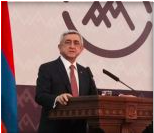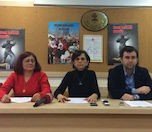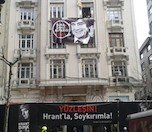[FULL TEXT] Murathan Mungan's Hrant Dink Memorial Speech
![[FULL TEXT] Murathan Mungan's Hrant Dink Memorial Speech](https://static.bianet.org/system/uploads/1/articles/spot_image/000/161/640/original/mr-2.jpg)
On the 8th anniversary of Hrant Dink’s assassination, poet and playwright Murathan Mungan spoke to the crowd gathered for the commemoration ceremony.
Below is the full text of Murathan Mungan’s speech [Translated by Nur Deriş Ottoman]:
Hello friends, Hrant Dink’s dear family and friends, all those who who uphold truth and justice, I greet you all with deep affection and respect.
We are assembled here once again for Hrant Dink, as we have done for the last eight years on the 19th of January, for Hrant Dink who became the son of millions of hearts after his death... “The Largest Organisation Behind the Murder” was the title of a piece I had written in 2007 immediately after he was murdered, it begins like this:
“There are times when one remains speechless in the face of so much to be said. You choke, unable to utter a single sound. The silence of being right is unlike other silences; its knot is not easily undone. (...) This death which was tragic and hurtful enough in and of itself, was also devastating with what it chillingly brought back from recent history, from revived memories. Each new death, brings back to life other deaths with the same pain felt on the first day of those deaths.
No matter how many books you may have written, it is at moments like these that you remain speechless.”
Today I will begin speaking from where I left off then: in this country where all forms of speechlessness exist, those who died, who were killed, who were massacred gave their lives so that we who remain would be able to say a few words more after them. So that the locks on our tongues could be broken, so that the burning truths which have kept us speechles would not devastate us even more... Those few words more which have remained locked up in history and which have made their way in time for so long, with so many losses and so many deaths... more than anything, we owe those few words more to them, to their memory. Repressive regimes know that fear is contagious, this is why they try to keep people’s fears alive. What they don’t know is that courage too is contagious. This is why we need to look into the eyes of life and the world, and speak with courage. Those words belong to no one else but us! We must never forget that.
Eight long years have gone by since Hrant Dink was killed. Babies born then have learned to speak, to read and write. The dead body of Hrant Dink, however, still lies spread on this sidewalk as the victim of a murder, the true story of which has still not been brought to light. Those who leave the world in desolation with their loss, multply life with their memories and with what they have entrusted us... And we who are watching over that entrusted legacy have been meeting here for the last eight years to voice our quest for justice and truth, to cry out that we wil not abandon Hrant’s dead body to the ruthless hands of oblivion.
We also want to make it clear that we will not abandon the Hrant Dink murder to the designs of those who try to instrumentalise this murder for their own political projects. So much was said and written during these eight years while justice remained frozen in its steps. Perhaps those words have thinned out with time, but the pain has not. The pangs of a non-executed justice continue to throb in our hearts, they continue to wring our consciences and to hurt our minds. Whatsmore, with each new victim whose names are uncountable here, with each new death since that day, Hrant Dink is slain once again and killed on this sidewalk. When justice remains undone, it multiplies its murderers and its victims. That is what’s happening once more. For even if the fingers drawing the trigger may change, the largest organisation behind the murder remains the same. The unchanging ominous truth of this country where so many murders are classified as “perpetrator unknown” but whose perpetrators are “obvious”, forces us to utter these same words over and over again. Even if governments and the masks of those in power change, the hands of the unchanging despotic central state tradition keep staging the same murky game each time. Those who carried out the Dersim carnage in 1938 and the Maraş massacre in 1978, those who instigated the 6-7 September events in 1955, those who burned alive the demonstrators seeking refuge in the Madımak Hotel in 1993, those who bombed Roboski in 2011 are all the same, and so is their mindset. Those who have wrought the hearts of those Saturday mothers kneeling on the sidewalks of Galatasaray for more than 500 weeks now, are also the same. We have been waiting for justice in a country where a party whose name includes the word “justice” has been in power for twelve years. But justice does not come!
Friends, people in this country do not want only their friends to be like themselves, but also their enemies. They want their enemies to resemble them so that they can recognise and know who and what they are fighting against. Those who resemble one another recognise each other’s arms, wounds, tricks and hatreds. Love can be faked, but not hatred. Hrant Dink, however, did not resemble them. For he spoke in a Turkish and in an Armenian which were unknown to them. As one who firmly believed in the equality and brotherhood of all peoples, he spoke in the language of peace. Not the words of a kind of peace to flap one’s jaws with empty wishes, but with the words of a longing for peace which he hoped would be real, true and enduring... His dictionary did not include words dripping with blood, he spoke not to revive hatred but to refresh memories. He called on people not to fuel their rancour, not to settle accounts, not to seek revenge, but to face up to their past, to their present and to themselves. He was opposed to all the policies condemning Turks and Armenians to act like “eternal enemies”, trapped in a spiral of hatred. He spoke a language far removed from theirs which branded “the other” with words of exclusion, which demonised and turned the “other” into an enemy. To them, his was a foreign language they had never known, did not want to know or learn. This is why in their eyes Hrant Dink was the “other” with his Armenianness, and a “foreigner” with his language. What they wanted to kill, alongside Hrant Dink, was precisely this language. They could never bring themselves to accept this language of peace, this humanistic language inviting the world to brotherhood... The language which we need perhaps more than ever today.
Friends, there is a long list of murders which can be dated all the way back to before the 1908 Second Constitution, murders committed in an organised, premeditated manner against journalists where the murderers would add a new notch to their guns with each new execution. Hrant Dink was 62nd on this long list to have become victim of such a political murder. In the country’s “Official History Agenda” where almost every page includes a political murder, a massacre or a mass killing, his destiny was marked on the 19th of January 2007, making him the 62nd person who paid the price of his words and his conscience with his life...
This is why we need to tell Hrant Dink’s story once again, to new generations who have grown up in these last eight years as well as to refresh some blurred memories. He was not only the spokesperson for the Armenian people but the voice of all Turkey. The voice of all those who are repressed, excluded and exploited. If he were with us today he would have been in our ranks in the Gezi Resistance and stood side by side with the most desolate, most forelorn people of the Middle East, the Yezidis who have been massacred 76 times throughout history. As a person who remained loyal to his values and to himself all his life, Hrant Dink changed so many things in this country with his reconciliatory but uncompromising stand. Even his death taught us so much. He spoke what he thought was right and defended what he believed in, without trying to please or win the favour of any group or of those wielding power. His struggle, like that of so many of his kind, is not one to come to a halt with his death.The crowds gathered here and everywhere are ample proof of this.
The peoples of this part of the world have paved their way through a complex, multi-layered past which cannot be elucidated with simplistic analyses or slipshod assessments. They have gone through so many stories lost in the labyrinth of history. This is why Hrant Dink believed there was a need for a new language to resolve the Armenian question and a new attitude going beyond the stereotyped discourse of both sides. He believed that with time the peoples of these lands could resolve this question in a peaceful way by talking about it in all its aspects with each other, by getting to know one another, by listening to one another’s stories, by understanding one another’s sufferings, by coming closer and touching one another. He believed in the need for dialogue between the memories and memory of both communities. He hoped in this way that official memory would finally be replaced by civil memory. He believed that this platform of dialogue, to be elaborated by the peoples themselves, would be the instrument to do away with the trump card of the Armenian question, used by imperial forces in international spheres against Turkey. This why one of Hrant Dink’s dreams was the opening of borders between Armenia and Turkey to allow for the two peoples to commingle. Friends, we should own up to not only the memory of our lost loved ones, but also to their dreams. And if that border were to be opened today, it would mean opening the door to so many other things. The opening of that border will scatter the heavy fog lurking over the Ararat Mountain for the last century. The opening of that border would so much become the year 2015.
Friends, as many of you know so well, behind every denial in these lands lie mass graves, be they dug long ago or recently. The eighth year of Hrant Dink’s murder coincides, as you also know very well, with the centenary of the 1915 Armenian genocide. The denial of the Armenian genocide is Turkey’s 100 years-long solitude. Its solitude in history, in memories, in minds, in consciences and in the world. Turkey’s 100 years-long solitude should finally come to an end. This country should come to terms with its history without fearing the ghosts of the past, acknowledge its responsibility for what happened in the past and free itself from the devastating weight of this dark legacy. It should desire to do so not because of the reproval of the world or to seek approval from others, but for its own good. This is also a means for this society to free itself from remaining a spectator to so many murders committed in the past and up to our day. For we know well that struggle is needed not against peoples, not against nations, but against mentalities. For a very long time now, social polarisation is being systematically and increasingly instigated in this country. Enmity is fueled and those in government are the very provocators of violence. In this political atmosphere, more like a twilight zone, Turkey is almost being dragged back step by step to its belated rendezvous with the Generals Enver Pasha and Talat Pasha. The motherland they claim “indivisible from Edirne to Ardahan” has been and is still being shattered into pieces from Susurluk to Roboski.
This is why we who have been raising our voices for Hrant, for justice, no longer want a caricature of democracy, but democracy itself. We urgently demand democracy and unconditional freedom of expression. We do not want the sham democracy of obscurantist tricks staged behind closed doors, but a democracy of daylight. We want a democracy which makes no concessions on secularism. We want to live in a society where no one is thirsting for the blood of others, where we can live without being or making victims. We want to live in a country where women are not murdered, where trans individuals and gays are not killed, where children are not massacred by government bullets almost every day. We want to live in peace, brotherhood and solidarity in a society where all kinds of ethnic, cultural, religious or gender-based discrimination have been done away with, where no one interferes in one another’s lifestyle, language, religion, confession, beliefs or non-beliefs, where everyone enjoys their rights as equal citizens, where citizens have attained democratic maturity. We want to live as people who respect the right to life of everyone and of every living being, of trees, of water, of parks, of woods and of forests . We want to live our lives as a multi-lingual, multi-cultural, multi-coloured people. We are unconditionally opposed to all forms of tutelage and we do not want to have to make a choice between the shoulder straps of the 12 March, 12 September coups and a moderate vindictiveness, a tie-wearing bigotry.
If we stand here today to say “Je suis Charlie Hebdo” in defense of the freedom of the press, we do so, unlike some others, with the clear conscience of those who took to the streets in protest when the “Özgür Ülke” (Free Country) newspaper was bombed in Istanbul in 1994.
Friends, with Hrant Dink’s death this country not only lost a valued son, it also lost one of its eminent journalists. At a time when journalism is losing its dignity in great measure, his loss and the loss of other journalists like him is bitterly felt. This in itself is reason enough for us to own up to Hrant Dink’s fourth child, the newspaper “AGOS” and its legacy.
I sincerely wish that the truths for which Hrant Dink and others like him laid down their lives will, in a not too distant future, become ordinary realities not even worth mentioning in a democracy bathing in daylight, in a society living together in peace!
I also wish that justice will come about in a near future and that those who will reassemble here in coming years will do so not to seek justice and rights which remain in waiting, but only in remembrance of Hrant and of memories of him.
In concluding my words I would like to lovingly embrace all members of the Dink family, and greet you all once again with deep affection and respect.
* This translation originally appeared on Agos newspaper.






